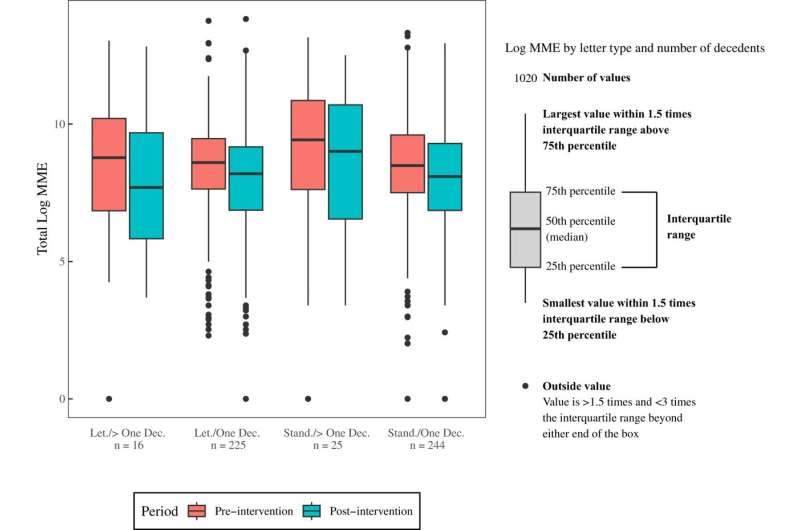This article has been reviewed according to Science X's editorial process and policies. Editors have highlighted the following attributes while ensuring the content's credibility:
fact-checked
peer-reviewed publication
trusted source
proofread
Want safer prescribing? Provide doctors with a plan for helping patients in pain, says study

Physicians who are notified that a patient has died of a drug overdose are more judicious in issuing controlled substances if the notification includes a plan for what to do during subsequent patient visits, according to a study published today in Nature Communications.
Compared to a letter with demonstrated effectiveness at improving prescribing safety, physicians who received notifications with additional planning guidance reduced prescriptions of opioids by nearly 13%. They also reduced prescriptions of the anxiety medications benzodiazepines by more than 8%. Together, these drugs constitute the bulk of prescription drug overdoses.
The results suggest that the guidance, known as if/when planning prompts, may lower risks to patients by reducing the intensity and frequency of these prescriptions. The findings also indicate that letters notifying a physician that a patient has fatally overdosed are more effective when they include guidance prompts.
The letter with planning prompts asked the doctor to carry out a specific plan, "When your next patient presents with pain, keep… [these] ... recommendations close at hand to assist with their safe care. Also, be comfortable voicing your concern about prescribing safety with them so that they are also aware of the dangers associated with scheduled drugs."
"Providing physicians a simple plan that will guide them at a patient visit appears to help temper their use of these drugs," said Jason Doctor, lead author of the study and co-director of the Behavioral Sciences Program at the USC Schaeffer Center for Health Policy and Economics. "This represents a promising approach to reducing fatal drug overdoses, one that is both affordable and scalable."
The study builds on two previous ones conducted by Doctor and his colleagues. The first one found that physicians reduced opioid prescriptions by 10% in the three months following notification of a fatal overdose. A second study found that physicians reduced opioid prescriptions by 7% one year after receiving notification. The letter used in these previous studies served as the control in this study.
"This latest study is part of an evolution toward better understanding how to enact behavior change among physicians whose patients have suffered negative consequences from care by the medical community," said Doctor, who is also chair of the Department of Health Policy and Management at the USC Sol Price School of Public Policy.
The latest randomized study involved sending letters to 541 clinicians in Los Angeles County: 284 received a standard letter notifying them that a patient had died of an overdose; 257 received a letter with additional guidance.
More information: Jason N. Doctor et al, A randomized trial looking at planning prompts to reduce opioid prescribing, Nature Communications (2024). DOI: 10.1038/s41467-023-44573-5





















